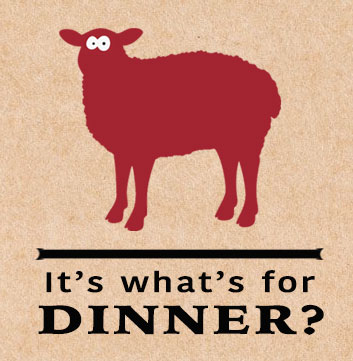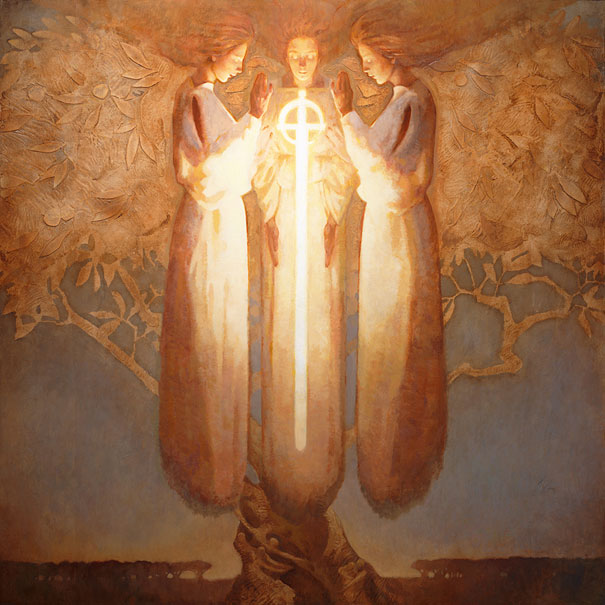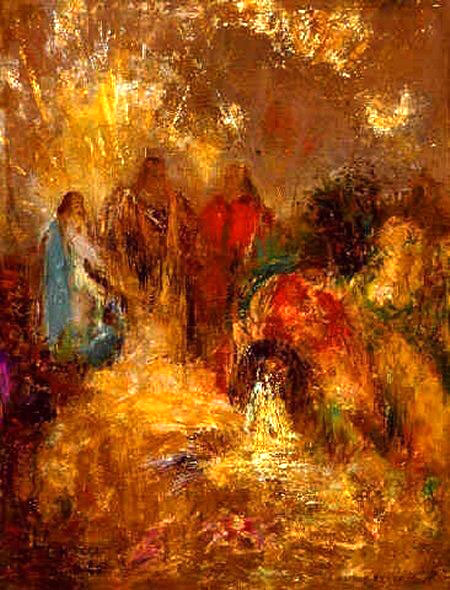
The Forgotten Sacrament? by Deborah Beach Giordano
Like sheep among wolves
 To be sent out like a sheep among wolves is like being listed as “Today’s special” on a menu. Or, as a related saying has it: “When the lion shall lie down with the lamb…. the lamb won’t get much sleep.”
To be sent out like a sheep among wolves is like being listed as “Today’s special” on a menu. Or, as a related saying has it: “When the lion shall lie down with the lamb…. the lamb won’t get much sleep.”
This is an important fact. Jesus rightly warns us: there are hungry wolves roaming the earth, as well as ravenous lions, who view us as a tasty morsel, ready-to-eat. We need to be wary and watchful — and always aware of the supreme danger to our health and safety:
Do not be afraid of those who kill the body but cannot kill the soul. Instead, fear the one who can destroy both soul and body in hell.
~ Matthew 10:28
Our bodies are divine gifts worthy of our care and concern — and our souls are even more precious. That’s why the Lord’s message is so important, and so ever-timely: it is our souls that are at the greatest risk of being devoured like so many lamb chops.
Idolatry of Achievement
For many, perhaps most, contemporary Christians, so-called “practical Christianity” — the expression of belief through work and actions — has become our primary focus; we could even say it is our exclusive focus. It has become who we are; our essence, our reason for being. Doing has replaced Holy Communion as our defining sacrament.
 Determined to change the world, to make it a better place, we plunge into projects and programs with great zeal and confidence…. yet rarely, if ever, pause to inquire after God’s will. What of prayer and fasting; patient listening; faithful awaiting of the still, small voice; and consideration to the state of our souls? No, no, no; we don’t have time for that. We’re busy making a difference; we’re involved in getting things done; we’re building the kingdom!
Determined to change the world, to make it a better place, we plunge into projects and programs with great zeal and confidence…. yet rarely, if ever, pause to inquire after God’s will. What of prayer and fasting; patient listening; faithful awaiting of the still, small voice; and consideration to the state of our souls? No, no, no; we don’t have time for that. We’re busy making a difference; we’re involved in getting things done; we’re building the kingdom!
Originating in a noble impulse to do good, the Path of Christ becomes twisted and turned into into an endless procession of programs and projects and proclamations, with the Lord Jesus a mere afterthought, pulled in at the last — if He is considered at all. Often, He doesn’t get so much as a mention. “Christian witness” becomes our business, our work, our way.
Sacraments or Distractions?
"An outward and visible sign of an inward grace.”
A sacrament is meant to deepen our sense of relationship with the Divine, to draw us nearer to the One whose love moves the sun and the stars and our hearts. It is a sacred channel, infusing our hearts with Holy energy, and bringing them into closer communion with the Radiant Lifegiver; it is a profound, inexpressibly glorious Intersection with Eternity.

A sacrament touches us, changes us — may even disturb us, for we are in the Presence of Something Other. We understand that there is more than we “know,” and we are both humbled by this realization and infused with gladness: we are beloved, cherished, and sought-after. The experience leaves an afterglow that transforms us into visible, living signs of God’s glory and love. It cannot be confused with a sense of “the satisfaction of a job well done,” because it is nothing like that. It is transpersonal: it is not about us, and yet it is deeply, ultimately for us. It isn’t about what we do — or even who we are, but Whose we are.
To misunderstand or misrepresent our busy-ness, our workings and worryings and programs and projects as remotely, infinitesimally resembling a Contact Point with the Divine is either the height of ignorance or the depths of wickedness.
Wolves in Plain Sight
Chasing after goals and objectives, programs, projected outcomes, popularity, prestige, publicity, and all the thousand and one other “outward signs” we have devised — or succumbed to — is eating us up. Lured away from the nourishing, sustaining Path of Christ, we’re edgy, snarling and snapping at one another; lonely, weary, downcast, exhausted…. spiritually starved: very much like the wolves that Jesus warned us about.
And many, many who were called to the Lord’s Way have left the flock — having hungered, but not been fed.
The Only Way
So Jesus asked the Twelve, “Do you want to leave too?” Simon Peter replied, “Lord, to whom would we go? You have the words of eternal life. We believe and know that You are the Holy One of God.”
~ John 6:67-69, Matthew 16:16
 There is no one else for us to go to, but Christ. It is to Him and His Way that we have been called. He alone can heal our hearts, nourish our spirits, and bring peace to our souls. He alone can lift us up in love, restore our hope and our courage, and repair our fragmented communities and shattered relationships.
There is no one else for us to go to, but Christ. It is to Him and His Way that we have been called. He alone can heal our hearts, nourish our spirits, and bring peace to our souls. He alone can lift us up in love, restore our hope and our courage, and repair our fragmented communities and shattered relationships.
As followers of our Lord Jesus, we must remember, proclaim, and live into the truth of Christianity as an Encounter with the Sublime. This is the foundational power and reality of the Way of Christ: it is based on astonishing, awe-inspiring, repeated transforming experiences of The Sacred.
Back to Basics
Christians are not merely a collection of unrelated individuals seeking to “do good;” many others do as much. We are disciples of Jesus of Nazareth, who is our Messiah. In Him and through Him we are shepherded into a heavenly estate: here and hereafter.
The point and purpose of our faith (the Alpha and Omega, we might say) is Christ: in Him and through Him we encounter the Living God; we enter into communion with the Divine Inexpressible; we are transformed by grace. This is the Way we are called to follow, the “work” we are to pursue, the experience we should anticipate, exult in, and approach with awe-filled humility and gratitude.
Good deeds have their place, but they do not define us. Our claim as Christians — the central, primary, exclusive claim, beginning with the first disciples — is of a divine Presence here, among us. For us. This life, as precious a gift as it is, is not all there is. Troubles and tragedies, as terrible and exhausting as they are, are only passing trials. Death, which seems so final, so lasting, is not the End. There is Something Other, Something More: Something Wonderful beyond description.
The Word became flesh and made His dwelling among us. We have seen His glory, the glory of the one and only Son from the Father, full of grace and truth.
~ John 1:14
That is basic Christianity.
Holy Communication
"The greatest honor we can give Almighty God is to live gladly because of the knowledge of His love."
~ Julian of Norwich
Though the Encounter may inspire us to action, the resultant work holds no redemptive power in itself. What matters is our souls, our hearts, our connection with The Eternal; anything that gets in the way, that blocks the flow of grace, that misdirects us, does harm and not good.
Care of the soul is essential. Maintaining our Connection with the Source is essential — and the only way that can be done is through consistent use: keeping the channel open. And the best way to do that is through prayer.
The Forgotten Sacrament?
In Protestant Christianity, the sacraments are understood to be those actions performed by Jesus during His earthly ministry; specifically, baptism and the Lord’s Supper (also known as Holy Communion). Each of these were implemented once.
Now, I want to suggest that there is another sacrament — one that Jesus enacted repeatedly — which has been, not overlooked, exactly, but perhaps under-appreciated because it was so routinely administered. Used by the Lord Christ, again and again — to cure the sick, the chronically ill, the dying; to multiply the loaves and fishes; to cast out demons; to bless, forgive, and comfort: prayer.

What stronger endorsement could there be than Jesus’ recourse to prayer before calling Lazarus from the grave, and, greatest of all, during His own dark night in the garden of Gethsemane? The disciples’ belief in the dynamic force and transcendent power of prayer is shown by their insistence that He “teach us to pray.” It was a sacred action which channeled divine energy and wisdom into the one who prayed, and brought Him into the Presence of God; it was an intersection where “heaven and earth met and kissed one another.”
The fact that “the Lord’s Prayer” has been cherished and carefully transmitted through the millennia is proof of our ongoing yearning to enter into that same holy communication which Jesus shared with the Beloved. We, too, want to pray as the Lord Christ did — to encounter the Sublime, to see the Light, to rejoice in God.
Surely prayer is the primary, the first and greatest sacrament: a holy communion, connecting us with God; a channel of grace and wisdom that surpasses (mere) understanding. In prayer — not simple chit-chat, not a list of requests; not telling, but patient, honest, vulnerable listening — we can follow the Way bequeathed to us by our Lord: we can enter into a personal encounter with the Holy.
That is basic Christianity. We proclaim Christ Jesus as the intersection of God and mankind: the One who enlivens and enlightens our souls and who leads us to the Divine Presence, where there is the fullness of joy.
As Thomas Aquinas said at the end of his life, “all else is dross.”
May the glory and grace of our Lord be with you,
Deborah ✟
Suggested Spiritual Exercise
Enter into prayer with an understanding and expectation that it is holy communion: a tremendous, awe-filled, potentially transfiguring personal encounter with the Holy. And brace yourself, for there is no telling what God may do — but do not be afraid.